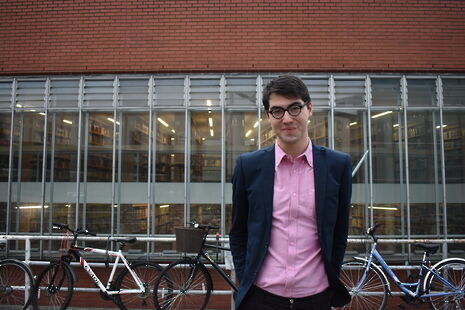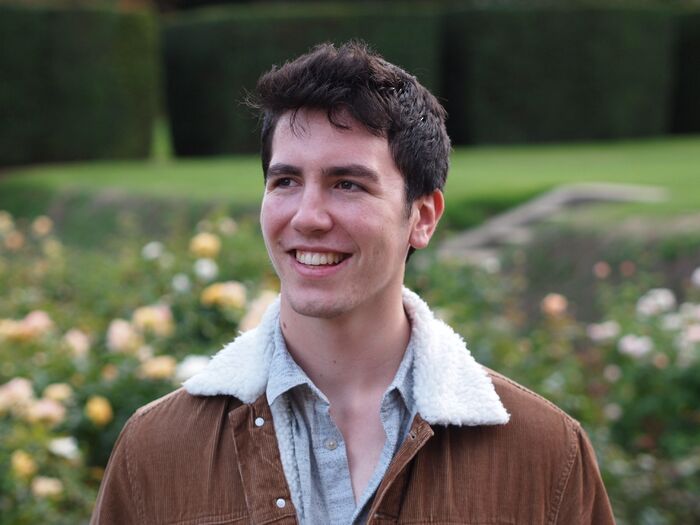‘You have to carve a little space for yourself’: The academics ‘queerying’ our curricula
LGBTQ+@Cam is a new programme aiming to promote research, outreach and network building related to queer, trans and sexuality studies

“You have to carve a little space for yourself, which is what queer people have done forever”, said PhD student George Severs, speaking about a current lack of opportunities for exploring queer theory in higher education, barring personally motivated study.
“There is space for it”, noted CUSU LGBT+ Campaign President Alistair Hyde, and although “a lot of it is self-driven”, “it’s often well-received.”
LGBTQ+@Cam, launched in January this year by the School of Humanities and Social Sciences and currently funded for at least three years, is a new programme aiming to promote research, outreach and network building related to queer, trans and sexuality studies at Cambridge.
Thus far, their work has included the development of seminars and workshops, along with a new series on Youtube interviewing researchers about how we can begin to ‘queer(y)’ the curriculum.
What does it cost all of us, that a kind of identity policing has so prominently shaped people’s experiences?
“With this area we really don’t know how much we don’t know because of the amount of restriction on areas of study as the inevitable result of the stigmatization of LGBTQ people and identities in the past”, said Dr Sarah Franklin, Head of Sociology Department and Director of the LGBTQ+@Cam programme.
Franklin also noted that the programme is based principally in the sociology department primarily because they “get a huge amount of interest in this area”, but the department currently employs no permanent members of staff specifically undergoing LGBTQ research. The LGBTQ+@Cam programme is therefore also linked to a fundraising campaign for a chair in LGBTQ Studies at Cambridge.
She described the programme’s aim as being “to build a new infrastructure to support LGBTQ research and teaching”, noting that “there is already quite a lot of that happening” at the University through the centre for Gender Studies and the Centre for Family Research, as well as within individual faculties.
Franklin emphasised that the goal is not “to replace or supercede” current efforts, but rather to “enhance and build upon” them.
Currently, the programme is working with 15 departments, across all six of the University’s schools, as well as a number of colleges, with a view to developing a programme that other departments, across both the University and the country, will be able to replicate.
Speaking about the importance of such initiatives, Franklin raised the Alan Turing question, asking what people such as Turing may have achieved, had they not lived their lives subject to oppression based on their identities: “We don’t know how much we don’t know because of the restrictions that have made certain ways of being, and by definition I assume also certain ways of thinking, inaccessible.
“What does it cost the university? What does it cost society? What does it cost communities? What does it cost all of us, that a kind of identity policing has so prominently shaped people’s experiences?”, Franklin asked.
She further spoke of the importance of creating accessible queer spaces, saying that, despite the University’s record of being an accepting place for LGBTQ students, this is a “very important thing to do here at Cambridge because I really don’t think we’re quite at the point where we can just take for granted that it’s a picnic to be a queer student here.”
Dr Caroline Gonda, a fellow in English at St Catherine’s College and subject of one of the recent Queer(y)ing the Curriculum videos, explained that the initiative is “not just about queer content, it’s about queer ways of thinking and bringing queer perspectives to bear.”
You shouldn’t have to wait till the third year [to have access to queer studies]
She praised the introduction of a new third-year paper entitled “Love, Gender and Sexuality 1740-1824”, explaining that queer thinking “happens in dissertations, it can happen in individual essays or individual lectures, but this is the first time there has been a sustained commitment to making space in the undergraduate curriculum, certainly in my period, for thinking specifically about sexuality, and about gender and sexuality together.”
Planned to be taught for the first time in 2020, the paper will have taken three years from the initial proposal to be integrated into the university curriculum.
But Gonda also told Varsity that further steps still need to be taken: “Cambridge is supposed to be one of the safest places to be LGBTQ+, but that doesn’t mean that there’s nothing left to do.
“I’m glad these developments are happening, and that Cambridge is feeling more like a place where this work can happen. There’s been for some years now a Queer Cultures Seminar in the English Faculty for postgraduates, but I think that the teaching does need to be happening and visible in the Undergraduate Tripos as well.”
As far as the steps taken by the English faculty are concerned, Gonda was enthusiastic but pointed out that “you shouldn’t have to wait till the third year [to have access to queer studies]”.
Asked how we should go about ‘queerying’ the curriculum, she argued that a combination of both introducing new papers and materials and questioning existing perspectives is needed.
Explaining the importance of the movement, Gonda spoke about a recent conversation with a student recently regarding queer love poems. The student spoke of the “importance of feeling seen and validated in the queer perspective she was bringing”.
“‘Queerying’ the curriculum is important because having more ideas to play with is always going to be better for scholarship”, said CUSU LGBT+ Campaign President Alistair Hyde.
He spoke about the “symbolic historic academic violence committed against groups such as LGBT+ people”, and stressed, therefore the need “to recognise the struggles and legitimise the work done by these groups” in order to help to “remedy, or at least acknowledge” past events.
There is a shift towards [LGBTQ history] being seen as proper history, valuable history
Hyde recounted anecdotal experiences of students attempting to explore queer theory, affirming that “there is space for it” and that “a lot of it is self-driven but it’s often well-received.”
He said that, currently, the majority of work is done by students choosing to explore a certain queer angle, saying “that’s great but it would [also be] great if that was included more mainstream-ly so that people who aren’t part of those minority groups and who aren’t necessarily particularly interested in them, also learn about these things.”
“The fact that [queer theory] isn’t explicitly included in the curriculum shows that there’s a long way to go”, Hyde added.
Asked how best to bring about progress in this area, Hyde said, “I think a lot of it comes in approaching lecturers personally”, adding that “they have streams of emails and I’m sure many of them are sympathetic but it’s also about having the time and the energy.”
Although the personal approach can be “a lot of labour for the students”, Hyde warned that “big targeted campaigns can put people’s hackles up which is usually counter-productive, at least in the short term”, though noted: “if nothing happens after that, sure, collectivise, push harder, use faculty reps.”
Speaking of the future, he said: “Hopeful, always hopeful,” and added, “It’s something that I’m sure will continue to be worked on and will take more time, but there’s progress happening.”
The university is a very supportive place to do this work
Currently researching the history of HIV/AIDs activism in the UK, George Severs, a PhD student at Selwyn College, described how he has been “self-driven” in his pursuit of queer thinking and queer perspectives: “You have to carve a little space for yourself, which is what queer people have done forever.”
Asked about the importance of ‘queerying’ the curriculum, he explained that “If you look through a queer lens you start to see a whole realm of possibilities; but if you look through a modern lens or just a lens that is assuming certain things, you miss out quite a lot.” He added, “These people historically were there, and if we don’t study them, research them, write about them and teach them then we are denying their existence, denying their agency.”
Severs argued that today, “it would be unthinkable to have a History Faculty without a gender or sexuality area.” He said: “The university is a very supportive place to do this work, and hopefully we’re seeing progress from when in the past it has been a very difficult thing to find the support to do. There is a shift towards this being seen as proper history, valuable history.”
He highlighted a tangible increase in interest in queer studies over the last few years. Discussing the compulsory Historical Argument and Practice History paper, he said 2018 “is the first year that they’ve ever had somebody come in to do a sexuality week”, noting “last year everyone was so interested, everyone wants to do this, if there’s an option, wherever you are it’s always the most popular one.
“There’s scope for it, but at the moment some faculties are not fulfilling this to its full potential. There would be a big uptake if they did.”
 News / Christ’s announces toned-down ‘soirée’ in place of May Ball3 February 2026
News / Christ’s announces toned-down ‘soirée’ in place of May Ball3 February 2026 News / Right-wing billionaire Peter Thiel gives ‘antichrist’ lecture in Cambridge6 February 2026
News / Right-wing billionaire Peter Thiel gives ‘antichrist’ lecture in Cambridge6 February 2026 News / John’s duped into £10m overspend6 February 2026
News / John’s duped into £10m overspend6 February 2026 News / Epstein contacted Cambridge academics about research funding6 February 2026
News / Epstein contacted Cambridge academics about research funding6 February 2026 News / Corpus FemSoc no longer named after man6 February 2026
News / Corpus FemSoc no longer named after man6 February 2026











